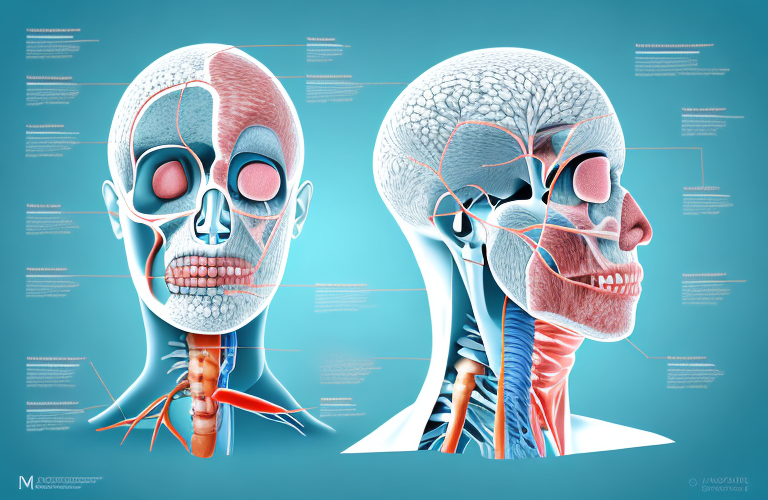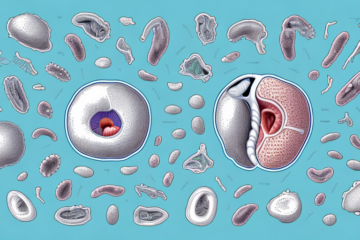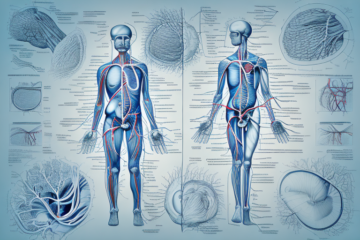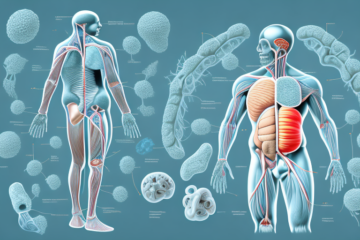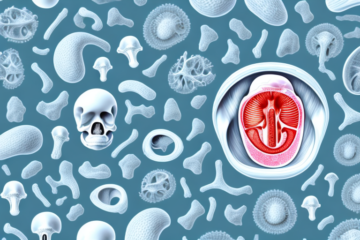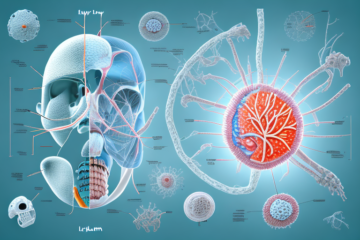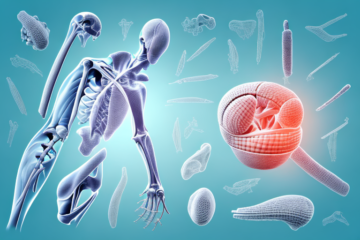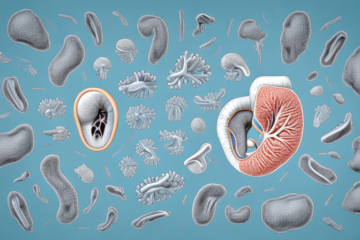The thyroid gland is a small, butterfly-shaped organ located at the base of the neck, just below the Adam’s apple. It plays a vital role in the endocrine system, which regulates various body functions by producing and releasing hormones. The thyroid gland produces two primary hormones, thyroxine (T4) and triiodothyronine (T3), which are essential for maintaining a healthy body metabolism, growth, and development. In this article, we will delve deeper into the function, anatomy, and disorders of the thyroid gland.
Understanding the Thyroid Gland
The thyroid gland is a complex organ consisting of two lobes connected by a bridge of tissue called the isthmus. It is richly supplied with blood vessels and lymphatic vessels and is responsible for producing hormones that regulate various functions in the body. The thyroid gland works by taking in iodine from the blood and converting it into T4 and T3 hormones. These hormones are then released into the bloodstream and transported throughout the body, where they bind to receptors in various organs and tissues.
The thyroid gland plays a crucial role in maintaining the body’s metabolism. It regulates the rate at which the body uses energy, controls the body’s temperature, and affects the growth and development of various organs and tissues. When the thyroid gland produces too much or too little hormone, it can lead to a range of health problems, including weight gain or loss, fatigue, and mood changes.
Thyroid disorders are common, affecting millions of people worldwide. Some of the most common thyroid disorders include hypothyroidism, hyperthyroidism, and thyroid nodules. These conditions can be diagnosed through blood tests, imaging studies, and physical exams. Treatment options vary depending on the type and severity of the condition and may include medication, surgery, or radioactive iodine therapy.
The Role of the Thyroid in Hormonal Balance
The thyroid gland plays a vital role in maintaining hormonal balance in the body. The thyroid hormones T4 and T3 influence various metabolic processes, including heart rate, blood pressure, body temperature, and energy expenditure. These hormones also play a crucial role in growth and development, especially in children and adolescents.
In addition to its role in metabolic processes and growth, the thyroid gland also affects mood and cognitive function. Thyroid hormones help regulate serotonin levels in the brain, which can impact mood and emotional well-being. Studies have also shown that thyroid dysfunction can lead to cognitive impairment and memory problems. Therefore, it is important to maintain a healthy thyroid gland for overall physical and mental health.
Common Thyroid Disorders and their Symptoms
Thyroid disorders are prevalent and affect millions of people worldwide. The two most common thyroid disorders are hypothyroidism and hyperthyroidism. Hypothyroidism occurs when the thyroid gland does not produce enough thyroid hormones, leading to a slower metabolism, weight gain, fatigue, and depression. Hyperthyroidism, on the other hand, occurs when the thyroid gland produces an excess of thyroid hormones, leading to a faster metabolism, weight loss, nervousness, and tremors. Other thyroid disorders include thyroid nodules, goiters, and thyroid cancer.
Thyroid nodules are growths or lumps that form within the thyroid gland. They are usually benign, but in some cases, they can be cancerous. Thyroid nodules can cause difficulty swallowing, hoarseness, and a visible lump in the neck. Goiters, on the other hand, are an enlargement of the thyroid gland. They can be caused by iodine deficiency, thyroiditis, or other thyroid disorders. Goiters can cause difficulty breathing, swallowing, and a visible swelling in the neck.
Thyroid cancer is a rare type of cancer that affects the thyroid gland. It can be difficult to detect in its early stages, as it often does not cause any symptoms. However, as the cancer grows, it can cause a lump in the neck, difficulty swallowing, hoarseness, and swollen lymph nodes. Treatment for thyroid cancer usually involves surgery to remove the thyroid gland, followed by radiation therapy or chemotherapy.
Diagnosing Thyroid Disorders: Tests and Exams
Diagnosing thyroid disorders involves a series of tests and exams. These include a physical exam, blood tests, ultrasound, biopsy, and radioactive iodine scan. A physical exam involves checking for swollen or enlarged glands in the neck, while blood tests look for hormone levels and antibodies that may indicate a thyroid problem. Ultrasounds, biopsies, and radioactive scans are used to detect thyroid nodules or cancer.
It is important to note that the symptoms of thyroid disorders can be similar to other health conditions, such as depression or menopause. Therefore, it is crucial to have a thorough evaluation by a healthcare professional to determine the underlying cause of the symptoms. In addition, some thyroid disorders, such as Hashimoto’s thyroiditis, may require additional testing, such as a thyroid antibody test, to confirm the diagnosis.
Once a diagnosis is made, treatment options may include medication, surgery, or radioactive iodine therapy. The type of treatment recommended will depend on the specific thyroid disorder and its severity. It is important to work closely with a healthcare provider to develop a personalized treatment plan and to regularly monitor thyroid hormone levels to ensure proper management of the condition.
Treatment Options for Hypothyroidism and Hyperthyroidism
The treatment for hypothyroidism and hyperthyroidism depends on the severity of the condition and the underlying cause. Hypothyroidism is usually treated with thyroid hormone replacement therapy, which involves taking synthetic thyroid hormones to replace the deficient ones. Hyperthyroidism is treated with antithyroid medications, radioactive iodine therapy, or surgery to remove the thyroid gland.
In addition to these treatments, lifestyle changes can also help manage hypothyroidism and hyperthyroidism. For hypothyroidism, a healthy diet and regular exercise can help improve symptoms and prevent weight gain. For hyperthyroidism, stress management techniques such as meditation and yoga can help reduce symptoms and improve overall well-being.
It is important to work closely with a healthcare provider to determine the best treatment plan for hypothyroidism or hyperthyroidism. Regular monitoring of thyroid hormone levels and symptoms is necessary to ensure that the treatment is effective and adjusted as needed.
Medications for Managing Thyroid Disorders
Medications are commonly used to manage thyroid disorders. These include hormone replacement therapy, antithyroid drugs, beta-blockers, and iodine supplements. Hormone replacement therapy is used to replace deficient thyroid hormones, antithyroid drugs work by reducing the production of thyroid hormones, beta-blockers are used to control heart rate and blood pressure, and iodine supplements are used to treat iodine deficiency.
It is important to note that the type of medication prescribed for a thyroid disorder will depend on the specific condition and individual needs of the patient. For example, hormone replacement therapy is typically used for hypothyroidism, while antithyroid drugs are used for hyperthyroidism. Additionally, some medications may have side effects and require careful monitoring by a healthcare provider. It is important to follow the prescribed dosage and schedule, and to report any adverse reactions to the healthcare provider.
Natural Remedies to Support Thyroid Health
There are also natural remedies that can help support thyroid health. These include eating a balanced diet rich in iodine, selenium, and zinc, practicing stress-reducing techniques like yoga and meditation, getting enough sleep, and avoiding environmental toxins that can affect the thyroid gland.
In addition to these remedies, certain herbs and supplements have been shown to support thyroid health. Ashwagandha, an adaptogenic herb, has been found to improve thyroid function and reduce stress levels. Another herb, bladderwrack, is rich in iodine and has been used for centuries to support thyroid health. Supplements like vitamin D and omega-3 fatty acids may also be beneficial for thyroid function.
It’s important to note that while natural remedies can be helpful, they should not be used as a substitute for medical treatment. If you suspect you have a thyroid issue, it’s important to consult with a healthcare professional for proper diagnosis and treatment.
Diet and Lifestyle Changes for a Healthy Thyroid
Maintaining a healthy thyroid requires a balanced diet and lifestyle. Eating a diet rich in whole foods, avoiding processed and sugary foods, getting regular exercise, managing stress, and getting enough sleep are essential for optimal thyroid health. These lifestyle changes can also help prevent thyroid disorders from developing.
In addition to these lifestyle changes, it is important to ensure that you are getting enough iodine in your diet. Iodine is a mineral that is essential for the production of thyroid hormones. Good sources of iodine include seaweed, fish, dairy products, and iodized salt. However, it is important to not consume too much iodine, as excessive intake can also lead to thyroid problems.
The Importance of Regular Thyroid Check-ups
Regular thyroid check-ups are critical to maintaining optimal thyroid health. Thorough blood work, physical exams, and ultrasounds can help detect thyroid disorders early on, when they are most treatable. It is recommended that individuals over the age of 35 get a thyroid screening every five years, and those with a family history of thyroid disorders get checked more frequently.
Thyroid disorders can have a significant impact on a person’s overall health and well-being. Symptoms such as fatigue, weight gain, and depression can be indicative of an underlying thyroid issue. However, these symptoms can also be attributed to other health conditions, making it important to get a proper diagnosis through regular thyroid check-ups. Additionally, untreated thyroid disorders can lead to more serious health complications, such as heart disease and osteoporosis. By staying on top of thyroid health through regular check-ups, individuals can take proactive steps to maintain their overall health and prevent potential complications.
How Stress Affects the Thyroid Function
Stress can have a significant impact on thyroid function. Prolonged stress can lead to an overproduction of cortisol, a stress hormone that can interfere with the production and release of thyroid hormones. Managing stress through relaxation techniques like meditation, yoga, and deep breathing can help reduce cortisol levels, thus improving thyroid function.
In addition to cortisol, stress can also affect the immune system, which can lead to autoimmune thyroid disorders such as Hashimoto’s thyroiditis and Graves’ disease. These conditions occur when the immune system mistakenly attacks the thyroid gland, causing inflammation and damage. Stress can trigger or worsen these conditions, making it important to manage stress levels for those with autoimmune thyroid disorders.
Furthermore, stress can also impact the absorption of thyroid medication. Studies have shown that stress can reduce the effectiveness of thyroid medication, leading to symptoms of hypothyroidism. It is important for individuals taking thyroid medication to manage their stress levels and discuss any changes in symptoms with their healthcare provider.
Pregnancy and the Thyroid: What You Need to Know
Pregnancy can have a significant impact on thyroid health. Pregnant women require more thyroid hormones to support the growth and development of the fetus, and thus are more prone to thyroid disorders. It is essential for pregnant women to get regular thyroid check-ups and discuss any concerns with their healthcare provider.
In addition, untreated thyroid disorders during pregnancy can lead to complications such as premature birth, low birth weight, and even miscarriage. It is important for pregnant women to maintain a healthy thyroid function through proper nutrition and medication, if necessary. Your healthcare provider can provide guidance on how to manage thyroid disorders during pregnancy to ensure the best possible outcomes for both mother and baby.
Impact of Environmental Toxins on Thyroid Health
Environmental toxins can also have a significant impact on thyroid health. Chemicals like perchlorate, found in rocket fuel, and bisphenol-A (BPA), found in plastic and canned food liners, can interfere with thyroid hormone production and function. Minimizing exposure to these toxins, eating organic foods, and filtering drinking water can help reduce the risk of thyroid disorders caused by environmental toxins.
In addition to perchlorate and BPA, other environmental toxins that can affect thyroid health include polychlorinated biphenyls (PCBs), found in electrical equipment and some industrial products, and polybrominated diphenyl ethers (PBDEs), found in flame retardants. These toxins can disrupt thyroid hormone synthesis and metabolism, leading to hypothyroidism or hyperthyroidism. It is important to be aware of potential sources of exposure and take steps to minimize them, such as avoiding processed foods and using natural cleaning products.
Coping with Emotional Challenges of Living with a Thyroid Disorder
Living with a thyroid disorder can be emotionally challenging. Dealing with symptoms like weight gain, fatigue, and depression can take a toll on mental health. Seeking support from friends, family, or a mental health professional can help in coping with emotional challenges associated with thyroid disorders.
It is important to also prioritize self-care when living with a thyroid disorder. This can include engaging in regular exercise, practicing relaxation techniques such as meditation or yoga, and maintaining a healthy diet. Additionally, joining a support group or online community for individuals with thyroid disorders can provide a sense of belonging and understanding. Remember, it is okay to ask for help and take time for yourself in managing the emotional challenges that come with living with a thyroid disorder.
Future Research Directions in Understanding the Thyroid Function
Research in understanding the thyroid function is ongoing. Studies are aimed at understanding the role of genetics, the impact of the microbiome on thyroid health, and the development of new therapies for thyroid disorders. Future research in these areas has the potential to revolutionize the diagnosis and treatment of thyroid disorders.
In conclusion, the thyroid gland plays a vital role in regulating various body functions and maintaining optimal health. It is essential to take steps to support thyroid health through a balanced diet, regular exercise, stress management, and regular check-ups. Understanding and managing thyroid disorders can help improve the quality of life and prevent health complications in the long run.
One area of future research in understanding the thyroid function is the impact of environmental factors on thyroid health. Studies are being conducted to investigate the effects of pollutants, such as heavy metals and pesticides, on thyroid function. This research could lead to a better understanding of the link between environmental factors and thyroid disorders.
Another area of future research is the development of personalized medicine for thyroid disorders. With advances in technology, it may be possible to tailor treatments to an individual’s specific genetic makeup and thyroid function. This could lead to more effective and targeted treatments for thyroid disorders.

